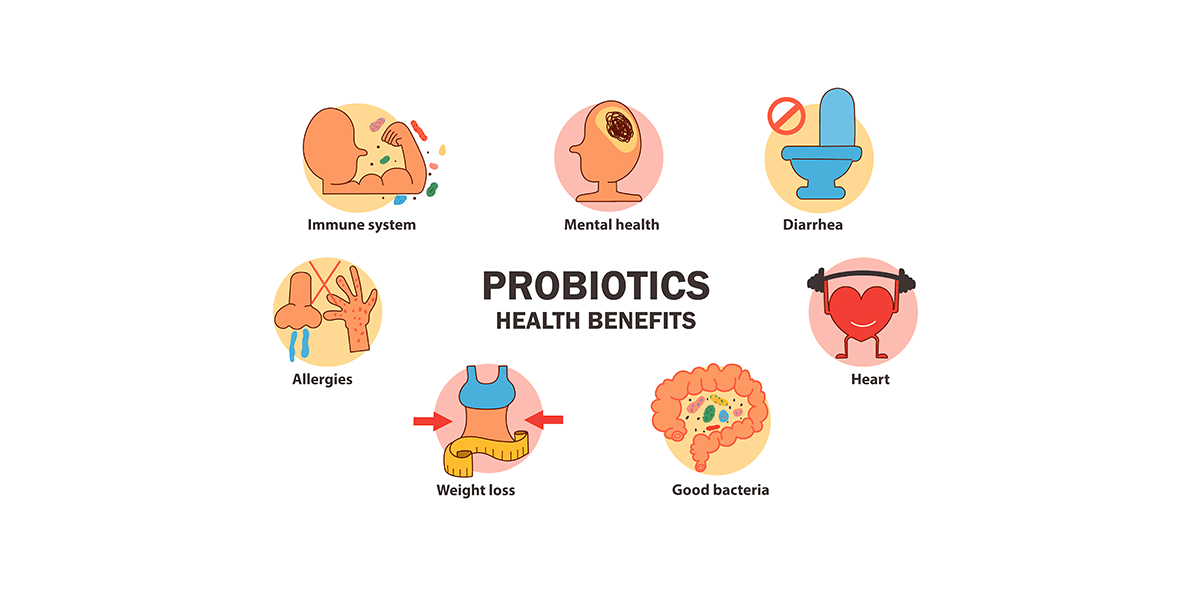
Table of Contents
Who, When, and How?
The Father of probiotics is Elie Metchnikoff, who introduced Probiotics in the early 2000s. He observed that some rural dwellers in the village of Bulgaria live longer despite the harsh climatic condition, poverty, and miserable lifestyle. He studied that they consume a lot of fermented dairy products, especially yogurt. Since then, he researched and found senility can be delayed by scientifically manipulating the host-friendly bacteria present in the intestinal microbiome.
Gradually in 2013, International Scientific Association for Probiotics and Prebiotics re-examined the concept in association with clinicians, scientists, and pharmacologists. They found the authentic sources, types, risk factors, and other details. (2)
Also Read – What Are Nutraceuticals ?
How do Probiotics Work?
Probiotics alter the metabolic activity or composition of gut bacteria. Good bacteria overcrowd bad bacteria in the alimentary system. This prohibits bad bacteria from getting multiplied and causing inflammation or harm to the body. Therefore, it balances the gut biome.
Moreover, it promotes good digestion and enables the body to extract proper nutrients from the food. It produces enzymes to retain vitamins and proteins. Some strains of probiotics strengthen the immune system. (3)
Functions
- Augments the biological fermenter by complementing the function of missed digestive enzymes, maintaining the pH, and replacing bad bacteria.
- Prevents gastrointestinal diseases.
- Prevents vaginal infections and maintain genital biome.
- Protects from urinary infection.
- Boosts the immune system.
- Supports the process of extracting nutrients from the crumbling of lactose. (3)
Natural Adobe of Probiotics in Human Body
The most common strain of probiotics, lactobacillus is found in the mouth, small intestine, and vagina of a human being. However, it can be derived from fortified food; nutraceutical based dietary supplements, and medicines.
Types of Probiotics
Categorically there are three types of probiotics. Those are as follows:
- Lactobacillus – This is the most common type and is found in dairy products like yogurt, cheese, etc. It produces lactase by breaking lactose in milk or sugar. It provides fuel to muscles and helps the body to absorb minerals from the food.
- Bifidobacterium – It is found in dairy products and vegetables. Some of the probiotic vegetables are green peas, kimchi,
- Saccharomyces boulardii – It is found in yeast. (4)
Food Sources
Fermented food is naturally potent with probiotics
- Yogurt
- Yeast
- Cheese
- Buttermilk
- Kefir
- Sourdough
- Pickles (5)
6 Common Strains of Probiotics
American College of Gastroenterology published in their research that the following strains of Probiotics may vitalize the body and provide adequate benefit. One must check for these types in the dietary supplement based on ailments. Nutraceutical products are self-certified and have no specific mode of administration. Therefore, one must consult a dietician or medical practitioner to select the right category of products. Following strains are important and also mentioned on labels of food products. Here, B stands for Bifidobacterium and L stands for lactobacillus:
- B. animalis – It helps digestion, fights food-borne diseases, and boosts immunity.
- B. breve – Lives in the vagina and digestive tract. Fights and ceases bacteria or yeast to multiple. Helps the body to retain nutrients from food.
- B. lactis – Found in dairy products. Helps to break down lactose and fiber.
- B. longum – It lives in the gastrointestinal tract. It ingests carbohydrates and antioxidants.
- L. acidophilus – It is present in the vagina and small intestine. It fights against bacterial intrusion.
- L. reuteri – Found in the mouth and intestine. Fights against bacteria responsible for tooth decay; also helps in digestion.
Treatable Health Conditions by Probiotics
Probiotics help in boosting the immune system and cure some diseases. Some common health conditions, which can be treated by these host-friendly bacteria, are irritable bowel syndrome, inflammatory bowel disease, infectious diarrhoea, etc. Researches have also acknowledged that it is effective on certain skin conditions, vaginal health, oral health, and allergies. (6)
Side effects
There are very rare possible harmful effects of probiotics; however, excessive intake may cause some side effects. Our body naturally restores microbes, adding more on those may trigger reactions like allergies, stomach upset, flatulence, and bloating.
Advisable Time of Intake
When to take prebiotics? As it contains microorganisms to enhance gut health, research shows some strains augment metabolism, therefore, it is better to take it before the meal. Consistency is more important than exact timing.
Nutraceutical Extract for Making of Finished Products
Nutraceutical extract is the main therapeutic component in a dietary supplement or nutraceutical based probiotics capsule. The quality and quantity of probiotic extract enhance the effects on the body. Anzen Exports shoulders the responsibility of sourcing superior quality extracts and trading it to several nutraceutical companies.
Read our updated blogs on nutraceuticals, active pharmaceutical ingredients, and herbal extracts to explore its array of benefits and a sneak peek of the drug industry. We would be happy to serve our readers and patrons with information and services. If you like this blog and find it informative, please share your comments in the section provided below and follow us on our social media.
Disclaimer:
Anzen Exports’ blog posts are based just on our research from cited websites. To be best informed, we advise consulting a doctor about an ingredient or medicine prior to taking it.
Sources:
- Medicinenet
Website – https://www.medicinenet.com/probiotics/article.htmL - NCBI
Website – https://www.ncbi.nlm.nih.gov/pmc/articles/PMC4421088/ - Healthline
Website – https://www.healthline.com/health/types-of-probiotics#common-probiotics - WebMD
Website – https://www.webmd.com/digestive-disorders/what-are-probiotics - Harvard Health Publishing
Website – https://www.health.harvard.edu/staying-healthy/how-to-get-more-probiotics - WebMD
Website – https://www.webmd.com/digestive-disorders/what-are-probiotics
